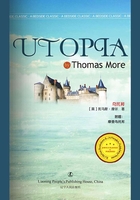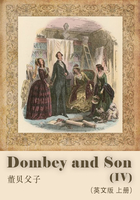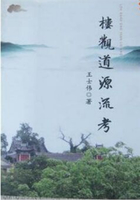Behold me on my way to an Emigrant Ship, on a hot morning early in June. My road lies through that part of London generally known to the initiated as 'Down by the Docks.' Down by the Docks, is home to a good many people-to too many, if I may judge from the overflow of local population in the streets-but my nose insinuates that the number to whom it is Sweet Home might be easily counted. Down by the Docks, is a region I would choose as my point of embarkation aboard ship if I were an emigrant. It would present my intention to me in such a sensible light; it would show me so many things to be run away from.
Down by the Docks, they eat the largest oysters and scatter the roughest oyster-shells, known to the descendants of Saint George and the Dragon. Down by the Docks, they consume the slimiest of shell-fish, which seem to have been scraped off the copper bottoms of ships. Down by the Docks, the vegetables at green-grocers' doors acquire a saline and a scaly look, as if they had been crossed with fish and seaweed. Down by the Docks, they 'board seamen' at the eating-houses, the public-houses, the slop-shops, the coffee-shops, the tally-shops, all kinds of shops mentionable and unmentionable-board them, as it were, in the piratical sense, making them bleed terribly, and giving no quarter. Down by the Docks, the seamen roam in mid-street and mid-day, their pockets inside out, and their heads no better. Down by the Docks, the daughters of wave-ruling Britannia also rove, clad in silken attire, with uncovered tresses streaming in the breeze, bandanna kerchiefs floating from their shoulders, and crinoline not wanting. Down by the Docks, you may hear the Incomparable Joe Jackson sing the Standard of England, with a hornpipe, any night; or any day may see at the waxwork, for a penny and no waiting, him as killed the policeman at Acton and suffered for it. Down by the Docks, you may buy polonies, saveloys, and sausage preparations various, if you are not particular what they are made of besides seasoning. Down by the Docks, the children of Israel creep into any gloomy cribs and entries they can hire, and hang slops there-pewter watches, sou'-wester hats, waterproof overalls-'firtht rate articleth, Thjack.' Down by the Docks, such dealers exhibiting on a frame a complete nautical suit without the refinement of a waxen visage in the hat, present the imaginary wearer as drooping at the yard-arm, with his seafaring and earthfaring troubles over. Down by the Docks, the placards in the shops apostrophise the customer, knowing him familiarly beforehand, as, 'Look here, Jack!' 'Here's your sort, my lad!' 'Try our sea-going mixed, at two and nine!' 'The right kit for the British tar!' 'Ship ahoy!' 'Splice the main-brace, brother!' 'Come, cheer up, my lads. We've the best liquors here, And you'll find something new In our wonderful Beer!' Down by the Docks, the pawnbroker lends money on Union-Jack pocket-handkerchiefs, on watches with little ships pitching fore and aft on the dial, on telescopes, nautical instruments in cases, and such-like. Down by the Docks, the apothecary sets up in business on the wretchedest scale-chiefly on lint and plaster for the strapping of wounds-and with no bright bottles, and with no little drawers. Down by the Docks, the shabby undertaker's shop will bury you for next to nothing, after the Malay or Chinaman has stabbed you for nothing at all: so you can hardly hope to make a cheaper end. Down by the Docks, anybody drunk will quarrel with anybody drunk or sober, and everybody else will have a hand in it, and on the shortest notice you may revolve in a whirlpool of red shirts, shaggy beards, wild heads of hair, bare tattooed arms, Britannia's daughters, malice, mud, maundering, and madness. Down by the Docks, scraping fiddles go in the public-houses all day long, and, shrill above their din and all the din, rises the screeching of innumerable parrots brought from foreign parts, who appear to be very much astonished by what they find on these native shores of ours. Possibly the parrots don't know, possibly they do, that Down by the Docks is the road to the Pacific Ocean, with its lovely islands, where the savage girls plait flowers, and the savage boys carve cocoa-nut shells, and the grim blind idols muse in their shady groves to exactly the same purpose as the priests and chiefs. And possibly the parrots don't know, possibly they do, that the noble savage is a wearisome impostor wherever he is, and has five hundred thousand volumes of indifferent rhyme, and no reason, to answer for.
Shadwell church! Pleasant whispers of there being a fresher air down the river than down by the Docks, go pursuing one another, playfully, in and out of the openings in its spire. Gigantic in the basin just beyond the church, looms my Emigrant Ship: her name, the Amazon. Her figure-head is not disfigured as those beauteous founders of the race of strong-minded women are fabled to have been, for the convenience of drawing the bow; but I sympathise with the carver:
A flattering carver who made it his care
To carve busts as they ought to be-not as they were.
My Emigrant Ship lies broadside-on to the wharf. Two great gangways made of spars and planks connect her with the wharf; and up and down these gangways, perpetually crowding to and fro and in and out, like ants, are the Emigrants who are going to sail in my Emigrant Ship. Some with cabbages, some with loaves of bread, some with cheese and butter, some with milk and beer, some with boxes, beds, and bundles, some with babies-nearly all with children-nearly all with bran-new tin cans for their daily allowance of water, uncomfortably suggestive of a tin flavour in the drink. To and fro, up and down, aboard and ashore, swarming here and there and everywhere, my Emigrants. And still as the Dock-Gate swings upon its hinges, cabs appear, and carts appear, and vans appear, bringing more of my Emigrants, with more cabbages, more loaves, more cheese and butter, more milk and beer, more boxes, beds, and bundles, more tin cans, and on those shipping investments accumulated compound interest of children.
I go aboard my Emigrant Ship. I go first to the great cabin, and find it in the usual condition of a Cabin at that pass. Perspiring landsmen, with loose papers, and with pens and inkstands, pervade it; and the general appearance of things is as if the late Mr. Amazon's funeral had just come home from the cemetery, and the disconsolate Mrs. Amazon's trustees found the affairs in great disorder, and were looking high and low for the will. I go out on the poop-deck, for air, and surveying the emigrants on the deck below (indeed they are crowded all about me, up there too), find more pens and inkstands in action, and more papers, and interminable complication respecting accounts with individuals for tin cans and what not. But nobody is in an ill-temper, nobody is the worse for drink, nobody swears an oath or uses a coarse word, nobody appears depressed, nobody is weeping, and down upon the deck in every corner where it is possible to find a few square feet to kneel, crouch, or lie in, people, in every unsuitable attitude for writing, are writing letters.
Now, I have seen emigrant ships before this day in June. And these people are so strikingly different from all other people in like circumstances whom I have ever seen, that I wonder aloud, 'What would a stranger suppose these emigrants to be!'
The vigilant, bright face of the weather-browned captain of the Amazon is at my shoulder, and he says, 'What, indeed! The most of these came aboard yesterday evening. They came from various parts of England in small parties that had never seen one another before. Yet they had not been a couple of hours on board, when they established their own police, made their own regulations, and set their own watches at all the hatchways. Before nine o'clock, the ship was as orderly and as quiet as a man-of-war.'
I looked about me again, and saw the letter-writing going on with the most curious composure. Perfectly abstracted in the midst of the crowd; while great casks were swinging aloft, and being lowered into the hold; while hot agents were hurrying up and down, adjusting the interminable accounts; while two hundred strangers were searching everywhere for two hundred other strangers, and were asking questions about them of two hundred more; while the children played up and down all the steps, and in and out among all the people's legs, and were beheld, to the general dismay, toppling over all the dangerous places; the letter-writers wrote on calmly. On the starboard side of the ship, a grizzled man dictated a long letter to another grizzled man in an immense fur cap: which letter was of so profound a quality, that it became necessary for the amanuensis at intervals to take off his fur cap in both his hands, for the ventilation of his brain, and stare at him who dictated, as a man of many mysteries who was worth looking at. On the lar-board side, a woman had covered a belaying-pin with a white cloth to make a neat desk of it, and was sitting on a little box, writing with the deliberation of a bookkeeper. Down, upon her breast on the planks of the deck at this woman's feet, with her head diving in under a beam of the bulwarks on that side, as an eligible place of refuge for her sheet of paper, a neat and pretty girl wrote for a good hour (she fainted at last), only rising to the surface occasionally for a dip of ink. Alongside the boat, close to me on the poop-deck, another girl, a fresh, well-grown country girl, was writing another letter on the bare deck. Later in the day, when this self-same boat was filled with a choir who sang glees and catches for a long time, one of the singers, a girl, sang her part mechanically all the while, and wrote a letter in the bottom of the boat while doing so.
'A stranger would be puzzled to guess the right name for these people, Mr. Uncommercial,' says the captain.
'Indeed he would.'
'If you hadn't known, could you ever have supposed-?'
'How could I! I should have said they were in their degree, the pick and flower of England.'
'So should I,' says the captain.
'How many are they?'
'Eight hundred in round numbers.'
I went between-decks, where the families with children swarmed in the dark, where unavoidable confusion had been caused by the last arrivals, and where the confusion was increased by the little preparations for dinner that were going on in each group. A few women here and there, had got lost, and were laughing at it, and asking their way to their own people, or out on deck again. A few of the poor children were crying; but otherwise the universal cheerfulness was amazing. 'We shall shake down by to-morrow.' 'We shall come all right in a day or so.' 'We shall have more light at sea.' Such phrases I heard everywhere, as I groped my way among chests and barrels and beams and unstowed cargo and ring-bolts and Emigrants, down to the lower-deck, and thence up to the light of day again, and to my former station.
Surely, an extraordinary people in their power of self-abstraction! All the former letter-writers were still writing calmly, and many more letter-writers had broken out in my absence. A boy with a bag of books in his hand and a slate under his arm, emerged from below, concentrated himself in my neighbourhood (espying a convenient skylight for his purpose), and went to work at a sum as if he were stone deaf. A father and mother and several young children, on the main deck below me, had formed a family circle close to the foot of the crowded restless gangway, where the children made a nest for themselves in a coil of rope, and the father and mother, she suckling the youngest, discussed family affairs as peaceably as if they were in perfect retirement. I think the most noticeable characteristic in the eight hundred as a mass, was their exemption from hurry.
Eight hundred what? 'Geese, villain?' EIGHT HUNDRED MORMONS. I, Uncommercial Traveller for the firm of Human Interest Brothers, had come aboard this Emigrant Ship to see what Eight hundred Latter-day Saints were like, and I found them (to the rout and overthrow of all my expectations) like what I now describe with scrupulous exactness.
The Mormon Agent who had been active in getting them together, and in making the contract with my friends the owners of the ship to take them as far as New York on their way to the Great Salt Lake, was pointed out to me. A compactly-made handsome man in black, rather short, with rich brown hair and beard, and clear bright eyes. From his speech, I should set him down as American. Probably, a man who had 'knocked about the world' pretty much. A man with a frank open manner, and unshrinking look; withal a man of great quickness. I believe he was wholly ignorant of my Uncommercial individuality, and consequently of my immense Uncommercial importance.
UNCOMMERCIAL. These are a very fine set of people you have brought together here.
MORMON AGENT. Yes, sir, they are a very fine set of people.
UNCOMMERCIAL (looking about). Indeed, I think it would be difficult to find Eight hundred people together anywhere else, and find so much beauty and so much strength and capacity for work among them.
MORMON AGENT (not looking about, but looking steadily at Uncommercial). I think so.-We sent out about a thousand more, yes'day, from Liverpool.
UNCOMMERCIAL. You are not going with these emigrants?
MORMON AGENT. No, sir. I remain.
UNCOMMERCIAL. But you have been in the Mormon Territory?
MORMON AGENT. Yes; I left Utah about three years ago.
UNCOMMERCIAL. It is surprising to me that these people are all so cheery, and make so little of the immense distance before them.
MORMON AGENT. Well, you see; many of 'em have friends out at Utah, and many of 'em look forward to meeting friends on the way.
UNCOMMERCIAL. On the way?
MORMON AGENT. This way 'tis. This ship lands 'em in New York City. Then they go on by rail right away beyond St. Louis, to that part of the Banks of the Missouri where they strike the Plains. There, waggons from the settlement meet 'em to bear 'em company on their journey 'cross-twelve hundred miles about. Industrious people who come out to the settlement soon get waggons of their own, and so the friends of some of these will come down in their own waggons to meet 'em. They look forward to that, greatly.
UNCOMMERCIAL. On their long journey across the Desert, do you arm them?
MORMON AGENT. Mostly you would find they have arms of some kind or another already with them. Such as had not arms we should arm across the Plains, for the general protection and defence.
UNCOMMERCIAL. Will these waggons bring down any produce to the Missouri?
MORMON AGENT. Well, since the war broke out, we've taken to growing cotton, and they'll likely bring down cotton to be exchanged for machinery. We want machinery. Also we have taken to growing indigo, which is a fine commodity for profit. It has been found that the climate on the further side of the Great Salt Lake suits well for raising indigo.
UNCOMMERCIAL. I am told that these people now on board are principally from the South of England?
MORMON AGENT. And from Wales. That's true.
UNCOMMERCIAL. Do you get many Scotch?
MORMON AGENT. Not many.
UNCOMMERCIAL. Highlanders, for instance?
MORMON AGENT. No, not Highlanders. They ain't interested enough in universal brotherhood and peace and good will.
UNCOMMERCIAL. The old fighting blood is strong in them?
MORMON AGENT. Well, yes. And besides; they've no faith.
UNCOMMERCIAL (who has been burning to get at the Prophet Joe Smith, and seems to discover an opening). Faith in-!
MORMON AGENT (far too many for Uncommercial). Well.-In anything!
Similarly on this same head, the Uncommercial underwent discomfiture from a Wiltshire labourer: a simple, fresh-coloured farm-labourer, of eight-and-thirty, who at one time stood beside him looking on at new arrivals, and with whom he held this dialogue:
UNCOMMERCIAL. Would you mind my asking you what part of the country you come from?
WILTSHIRE. Not a bit. Theer! (exultingly) I've worked all my life o' Salisbury Plain, right under the shadder o' Stonehenge. You mightn't think it, but I haive.
UNCOMMERCIAL. And a pleasant country too.
WILTSHIRE. Ah! 'Tis a pleasant country.
UNCOMMERCIAL. Have you any family on board?
WILTSHIRE. Two children, boy and gal. I am a widderer, I am, and I'm going out alonger my boy and gal. That's my gal, and she's a fine gal o' sixteen (pointing out the girl who is writing by the boat). I'll go and fetch my boy. I'd like to show you my boy. (Here Wiltshire disappears, and presently comes back with a big, shy boy of twelve, in a superabundance of boots, who is not at all glad to be presented.) He is a fine boy too, and a boy fur to work! (Boy having undutifully bolted, Wiltshire drops him.)
UNCOMMERCIAL. It must cost you a great deal of money to go so far, three strong.
WILTSHIRE. A power of money. Theer! Eight shillen a week, eight shillen a week, eight shillen a week, put by out of the week's wages for ever so long.
UNCOMMERCIAL. I wonder how you did it.
WILTSHIRE (recognising in this a kindred spirit). See theer now! I wonder how I done it! But what with a bit o' subscription heer, and what with a bit o' help theer, it were done at last, though I don't hardly know how. Then it were unfort'net for us, you see, as we got kep' in Bristol so long-nigh a fortnight, it were-on accounts of a mistake wi' Brother Halliday. Swaller'd up money, it did, when we might have come straight on.
UNCOMMERCIAL (delicately approaching Joe Smith). You are of the Mormon religion, of course?
WILTSHIRE (confidently). O yes, I'm a Mormon. (Then reflectively.) I'm a Mormon. (Then, looking round the ship, feigns to descry a particular friend in an empty spot, and evades the Uncommercial for evermore.)
After a noontide pause for dinner, during which my Emigrants were nearly all between-decks, and the Amazon looked deserted, a general muster took place. The muster was for the ceremony of passing the Government Inspector and the Doctor. Those authorities held their temporary state amidships, by a cask or two; and, knowing that the whole Eight hundred emigrants must come face to face with them, I took my station behind the two. They knew nothing whatever of me, I believe, and my testimony to the unpretending gentleness and good nature with which they discharged their duty, may be of the greater worth. There was not the slightest flavour of the Circumlocution Office about their proceedings.
The emigrants were now all on deck. They were densely crowded aft, and swarmed upon the poop-deck like bees. Two or three Mormon agents stood ready to hand them on to the Inspector, and to hand them forward when they had passed. By what successful means, a special aptitude for organisation had been infused into these people, I am, of course, unable to report. But I know that, even now, there was no disorder, hurry, or difficulty.
All being ready, the first group are handed on. That member of the party who is entrusted with the passenger-ticket for the whole, has been warned by one of the agents to have it ready, and here it is in his hand. In every instance through the whole eight hundred, without an exception, this paper is always ready.
INSPECTOR (reading the ticket). Jessie Jobson, Sophronia Jobson, Jessie Jobson again, Matilda Jobson, William Jobson, Jane Jobson, Matilda Jobson again, Brigham Jobson, Leonardo Jobson, and Orson Jobson. Are you all here? (glancing at the party, over his spectacles).
JESSIE JOBSON NUMBER TWO. All here, sir.
This group is composed of an old grandfather and grandmother, their married son and his wife, and their family of children. Orson Jobson is a little child asleep in his mother's arms. The Doctor, with a kind word or so, lifts up the corner of the mother's shawl, looks at the child's face, and touches the little clenched hand. If we were all as well as Orson Jobson, doctoring would be a poor profession.
INSPECTOR. Quite right, Jessie Jobson. Take your ticket, Jessie, and pass on.
And away they go. Mormon agent, skilful and quiet, hands them on. Mormon agent, skilful and quiet, hands next party up.
INSPECTOR (reading ticket again). Susannah Cleverly and William Cleverly. Brother and sister, eh?
SISTER (young woman of business, hustling slow brother). Yes, sir.
INSPECTOR. Very good, Susannah Cleverly. Take your ticket, Susannah, and take care of it.
And away they go.
INSPECTOR (taking ticket again). Sampson Dibble and Dorothy Dibble (surveying a very old couple over his spectacles, with some surprise). Your husband quite blind, Mrs. Dibble?
MRS. DIBBLE. Yes, sir, he be stone-blind.
MR. DIBBLE (addressing the mast). Yes, sir, I be stone-blind.
INSPECTOR. That's a bad job. Take your ticket, Mrs. Dibble, and don't lose it, and pass on.
Doctor taps Mr. Dibble on the eyebrow with his forefinger, and away they go.
INSPECTOR (taking ticket again). Anastatia Weedle.
ANASTATIA (a pretty girl, in a bright Garibaldi, this morning elected by universal suffrage the Beauty of the Ship). That is me, sir.
INSPECTOR. Going alone, Anastatia?
ANASTATIA (shaking her curls). I am with Mrs. Jobson, sir, but I've got separated for the moment.
INSPECTOR. Oh! You are with the Jobsons? Quite right. That'll do, Miss Weedle. Don't lose your ticket.
Away she goes, and joins the Jobsons who are waiting for her, and stoops and kisses Brigham Jobson-who appears to be considered too young for the purpose, by several Mormons rising twenty, who are looking on. Before her extensive skirts have departed from the casks, a decent widow stands there with four children, and so the roll goes.
The faces of some of the Welsh people, among whom there were many old persons, were certainly the least intelligent. Some of these emigrants would have bungled sorely, but for the directing hand that was always ready. The intelligence here was unquestionably of a low order, and the heads were of a poor type. Generally the case was the reverse. There were many worn faces bearing traces of patient poverty and hard work, and there was great steadiness of purpose and much undemonstrative self-respect among this class. A few young men were going singly. Several girls were going, two or three together. These latter I found it very difficult to refer back, in my mind, to their relinquished homes and pursuits. Perhaps they were more like country milliners, and pupil teachers rather tawdrily dressed, than any other classes of young women. I noticed, among many little ornaments worn, more than one photograph-brooch of the Princess of Wales, and also of the late Prince Consort. Some single women of from thirty to forty, whom one might suppose to be embroiderers, or straw-bonnet-makers, were obviously going out in quest of husbands, as finer ladies go to India. That they had any distinct notions of a plurality of husbands or wives, I do not believe. To suppose the family groups of whom the majority of emigrants were composed, polygamically possessed, would be to suppose an absurdity, manifest to any one who saw the fathers and mothers.
I should say (I had no means of ascertaining the fact) that most familiar kinds of handicraft trades were represented here. Farm-labourers, shepherds, and the like, had their full share of representation, but I doubt if they preponderated. It was interesting to see how the leading spirit in the family circle never failed to show itself, even in the simple process of answering to the names as they were called, and checking off the owners of the names. Sometimes it was the father, much oftener the mother, sometimes a quick little girl second or third in order of seniority. It seemed to occur for the first time to some heavy fathers, what large families they had; and their eyes rolled about, during the calling of the list, as if they half misdoubted some other family to have been smuggled into their own. Among all the fine handsome children, I observed but two with marks upon their necks that were probably scrofulous. Out of the whole number of emigrants, but one old woman was temporarily set aside by the doctor, on suspicion of fever; but even she afterwards obtained a clean bill of health.
When all had 'passed,' and the afternoon began to wear on, a black box became visible on deck, which box was in charge of certain personages also in black, of whom only one had the conventional air of an itinerant preacher. This box contained a supply of hymn-books, neatly printed and got up, published at Liverpool, and also in London at the 'Latter-Day Saints' Book Dep?t, 30, Florence-street.' Some copies were handsomely bound; the plainer were the more in request, and many were bought. The title ran: 'Sacred Hymns and Spiritual Songs for the Church of Jesus Church of Latter-Day Saints.' The Preface, dated Manchester, 1840, ran thus:-'The Saints in this country have been very desirous for a Hymn Book adapted to their faith and worship, that they might sing the truth with an understanding heart, and express their praise, joy, and gratitude in songs adapted to the New and Everlasting Covenant. In accordance with their wishes, we have selected the following volume, which we hope will prove acceptable until a greater variety can be added. With sentiments of high consideration and esteem, we subscribe ourselves your brethren in the New and Everlasting Covenant, BRIGHAM YOUNG, PARLEY P. PRATT, JOHN TAYLOR.' From this book-by no means explanatory to myself of the New and Everlasting Covenant, and not at all making my heart an understanding one on the subject of that mystery-a hymn was sung, which did not attract any great amount of attention, and was supported by a rather select circle. But the choir in the boat was very popular and pleasant; and there was to have been a Band, only the Cornet was late in coming on board. In the course of the afternoon, a mother appeared from shore, in search of her daughter, 'who had run away with the Mormons.' She received every assistance from the Inspector, but her daughter was not found to be on board. The saints did not seem to me, particularly interested in finding her.
Towards five o'clock, the galley became full of tea-kettles, and an agreeable fragrance of tea pervaded the ship. There was no scrambling or jostling for the hot water, no ill humour, no quarrelling. As the Amazon was to sail with the next tide, and as it would not be high water before two o'clock in the morning, I left her with her tea in full action, and her idle Steam Tug lying by, deputing steam and smoke for the time being to the Tea-kettles.
I afterwards learned that a Despatch was sent home by the captain before he struck out into the wide Atlantic, highly extolling the behaviour of these Emigrants, and the perfect order and propriety of all their social arrangements. What is in store for the poor people on the shores of the Great Salt Lake, what happy delusions they are labouring under now, on what miserable blindness their eyes may be opened then, I do not pretend to say. But I went on board their ship to bear testimony against them if they deserved it, as I fully believed they would; to my great astonishment they did not deserve it; and my predispositions and tendencies must not affect me as an honest witness. I went over the Amazon's side, feeling it impossible to deny that, so far, some remarkable influence had produced a remarkable result, which better known influences have often missed. [1]
Note
[1]After this Uncommercial Journey was printed, I happened to mention the experience it describes to Lord Houghton. That gentleman then showed me an article of his writing, in The Edinburgh Review for January, 1862, which is highly remarkable for its philosophical and literary research concerning these Latter-Day Saints. I find in it the following sentences:-'The Select Committee of the House of Commons on emigrant ships for 1854 summoned the Mormon agent and passenger-broker before it, and came to the conclusion that no ships under the provisions of the "Passengers Act" could be depended upon for comfort and security in the same degree as those under his administration. The Mormon ship is a Family under strong and accepted discipline, with every provision for comfort, decorum and internal peace.'















